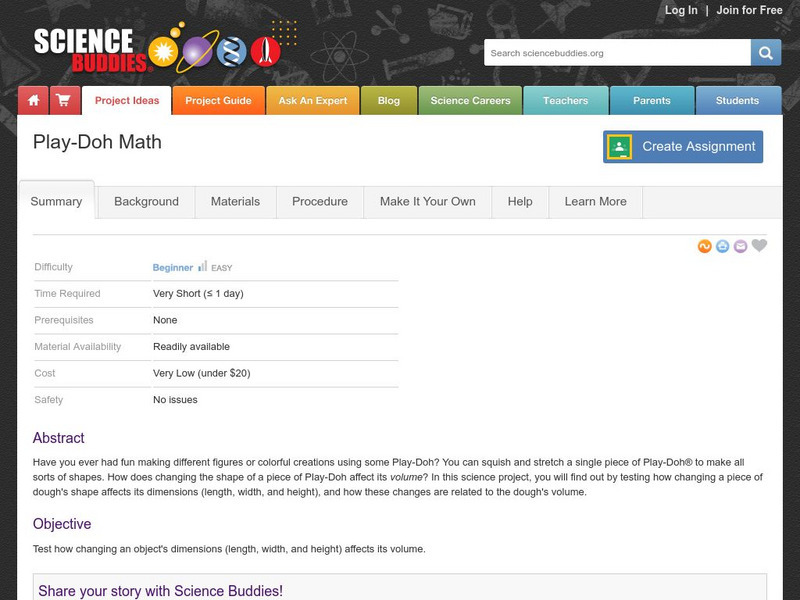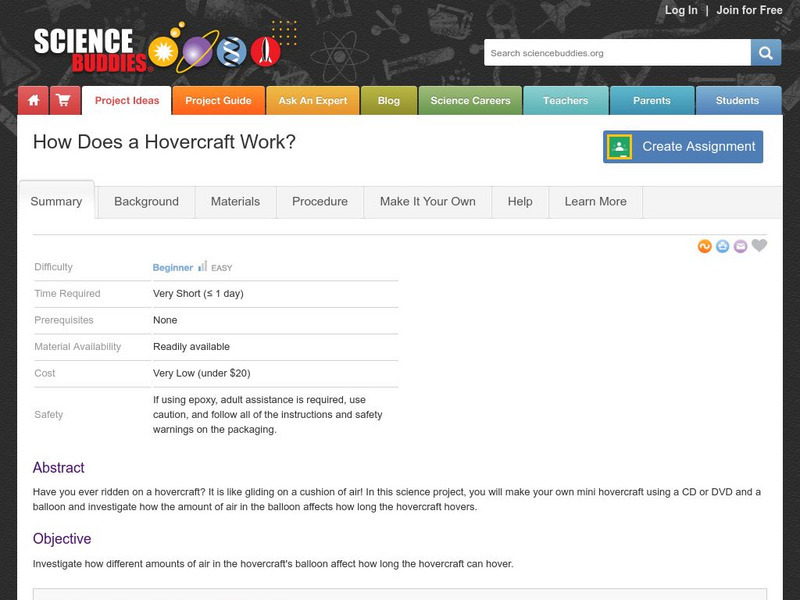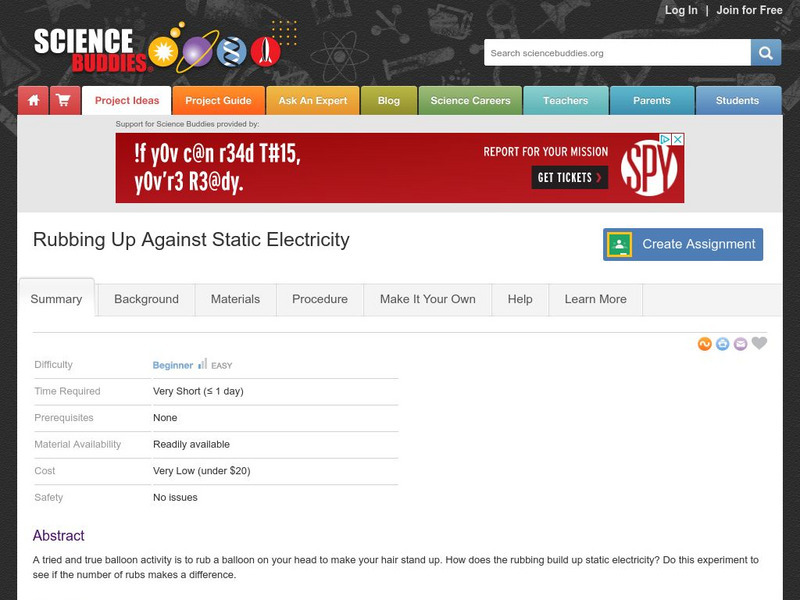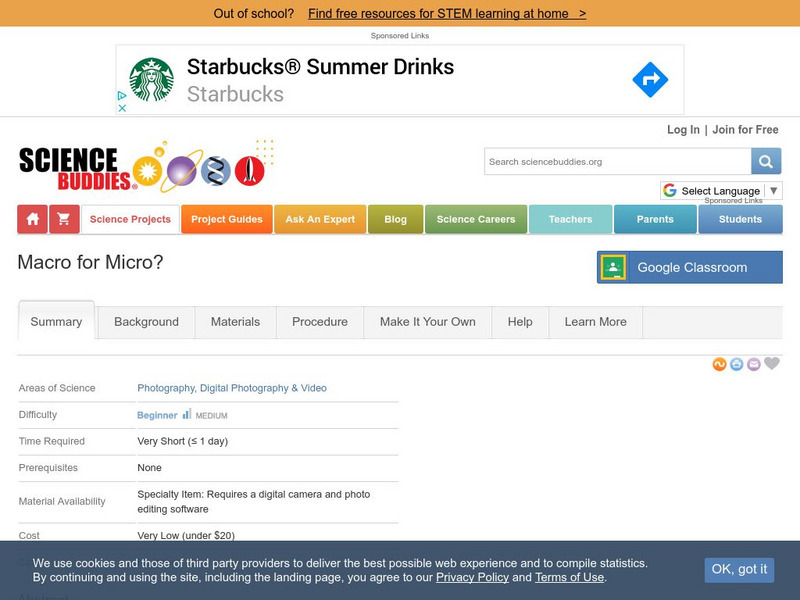Science Buddies
Science Buddies: Measuring the Moon
Sometimes a full moon can be so bright, you can walk around in the dark without a flashlight. How much brighter is a full moon than the other phases of the moon? How is the brightness of the moon measured?
Science Buddies
Science Buddies: How Many Seeds Do Different Types of Fruit Produce?
Do you like your strawberry jelly with or without the seeds? Are you glad to have a seed-free watermelon, or do you enjoy spitting the seeds into the garden? You might not like to find seeds in your fruit, but fruit is nature's way of...
Science Buddies
Science Buddies: A Matter of Time
Do you wake up at the crack of dawn, or do you need an alarm clock to wake you up each morning? It may surprise you that the two are not always in synch. Nowadays, we use Standard Time to set our watches instead of Solar Time. Which...
Science Buddies
Science Buddies: Pick a Card, Any Card
No matter what your favorite card game is, we all wish we could use psychic powers to draw the card we want on our turn. You may not have psychic powers, but you might have the power of probability on your side. Do this experiment and...
Science Buddies
Science Buddies: Finding Phyla
Animals come in all shapes and sizes, each a small part of the amazing diversity of life. These differences can also help us to classify animals into different groups. Which group do you belong to? Do this experiment to investigate the...
Science Buddies
Science Buddies: Play Doh Math
One piece of Play-Doh can make many different shapes. Even though you can change the shape by squishing or stretching the Play-Doh, it is still the same size unless you add or take away some of the dough. Try this experiment to test how...
Science Buddies
Science Buddies: Juice Box Geometry
Juice boxes are so convenient, just poke the straw in and sip away. It might surprise you how much thought goes into the design and manufacturing of a juice box. Each manufacturer has carefully calculated how big each side should be to...
Science Buddies
Science Buddies: M&m Geometry
Geometry is the study of how to use math to describe and investigate different points, lines and shapes. The way that a shape is described in geometry is with a formula, which is simply a mathematical way to calculate different...
Science Buddies
Science Buddies: How Does a Hovercraft Work?
Riding on a hovercraft is like gliding on a cushion of air. Make your own mini hovercraft in this experiment to test how hovercrafts work.
Science Buddies
Science Buddies: Rubbing Up Against Static Electricity
A tried and true balloon activity is to rub a balloon on your head to make your hair stand up. Learn how the rubbing builds up static electricity using this experiment to see if the number of rubs makes a difference.
Science Buddies
Science Buddies: How Do Different Materials React to Static Electricity?
Polyester clothing was generally accepted as a popular trend in fashion at one point in history. Now everybody wears cotton, which doesn't get static cling nearly as much. Why are some materials more susceptible to static cling than...
Science Buddies
Science Buddies: Digital Photo Contrast
What do you do if you take a photo and it turns out too dark or too bright? You can use your computer to fix it for you. In this experiment you will investigate how changing the contrast of a digital photo will change the colors and...
Science Buddies
Science Buddies: Soil Compaction
Have you ever had to dig a hole in really hard dirt? It is a lot of work. In this experiment you can make an instrument to test the soil and find out how compacted it is, before you dig.
Science Buddies
Science Buddies: Soil Color and Moisture
When you step in mud it can be very messy. How can you tell if soil is wet or dry before you step in it? In this experiment, you can see if color can help you figure it out.
Science Buddies
Science Buddies: Porosity and Particle Size
Often, when we think of something that is solid we think about rocks. But in reality, rocks have tiny holes of air inside them. This is called porosity. In this experiment you can find out what it means to be "solid as a rock."
Science Buddies
Science Buddies: Color Profiles
Did you know that the same digital photo you see on a computer monitor may not look as good in print? When it comes to color profiles, there are a lot of options: RGB, CMYK, grayscale and indexed color are just a few. Learn how to choose...
Science Buddies
Science Buddies: Bit Depth, Colors and Digital Photos
How many bits of information are in a digital photo? It depends on how many possible colors there are. Learn how to choose the right number of colors and bits to post your photo on the web or send it to your best friend.
Science Buddies
Science Buddies: Pinholes, Light and Aperture Size
Pinhole cameras are not a thing of the past. Even compared to all of the latest technology, a pinhole camera still gets beautiful results. Find out how this very simple aperture design works to control the way light enters the lens of...
Science Buddies
Science Buddies: Macro for Micro?
If the prefix "macro" means large and "micro" means small, then why will the macro setting of a digital camera help take a better picture of a small object? Do this experiment and get the big picture.
Science Buddies
Science Buddies: Go and Stop? Ant Traffic Signals
Have you ever stopped to watch a trail of ants moving back and forth between a food source and their nest? Have you ever wondered how they establish their trail? You've probably read that ants use chemical signals to communicate with one...
Science Buddies
Science Buddies: The Golden Rules of Photography
What is it that famous photographers do to make their images so pleasing to the eye? Find out if simple rules of geometry and symmetry can make you a better photographer.
Science Buddies
Science Buddies: Yogurt Cultures
Find out in this experiment how good bacteria can turn milk into a treat by investigating the optimal starter cultures for making yogurt from whole milk.
Science Buddies
Science Buddies: Can the Color of Your House Reduce Your Energy Bill?
Did you know that the color of your house could save money? Do this experiment to see which colors regulate temperature best in different environments. Learn how painting the house can save money on the energy bill.
Science Buddies
Science Buddies: Yeasty Beasties
While looking at a package of dry yeast it is hard to believe it is alive. But add the right ingredients and presto, the mixture becomes a bubbly, oozing, mess of life. What are the right ingredients? Do this experiment and figure it out...

























